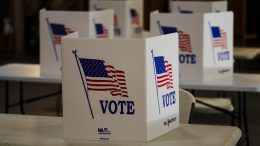From staff reports
Three area district attorneys have reached out to the newspaper with their thoughts about the enforcement of Gov. Tom Wolf’s mandates regarding operations of nonlife-sustaining businesses.
Here is a rundown of the opinions of Venango County DA Shawn White, Clarion County DA Drew Welsh and Crawford County DA Francis Schultz:
Shawn White – Venango County
White released this statement Tuesday:
“I want the residents and families of Venango County to be safe. It is my belief that the people who are trying to provide for their families should not be criminally penalized so long as they are operating in a manner that keeps everyone safe and follows the recommendations of the CDC guidelines.
“I trust our local business owners to decide what is best for them and their customers. I appreciate that our county commissioners, along with our state and local representatives, have been so vocal in their fight to reopen our county.
“That being said, civil or administrative matters such as professional licensing do not fall under my purview and are outside of the scope of my office. It would be inappropriate for me to offer any guidance or opinion concerning any potential civil liability.”
Drew Welsh – Clarion County
Welsh is asking Wolf to allow county district attorneys to “trust us to do our job.”
In a letter to Wolf, Welsh said DAs across the state have been exercising the discretion afforded to them and not prosecuting businesses that open in violation of Wolf’s stay-at-home and non-essential business orders.
He said Clarion County has moved into the yellow zone and that many businesses are re-opening. Welsh said he has had many questions regarding the role of the district attorney in the enforcement of the Wolf’s orders.
Welsh said DAs have been directed to the “Business Closure Order Enforcement Guide” that was posted online. Welsh said the notice deferred to district attorneys to “determine appropriate charges for suspected violations.”
Welsh said in his letter that the public “has been under belief that the issuance of citations and prosecution by the local District Attorney’s office is the final word on enforcement of your order.” Welsh said in the yellow zone that it appears that the only businesses that remain closed and subject to citation are those which require licenses to be issued by Wolf’s office and various administrative agencies.
“I do not want businesses to open based on a belief that their local DA’s office will not prosecute them only to find that your administration has taken steps to revoke their license and suspend their livelihood,” Welsh said in his letter.
Welsh asked Wolf to allow businesses to re-open so long as they take steps to maintain the safety of their employees.
“Please respect the role of each county’s District Attorney in making the appropriate decisions on whether businesses are placing our communities at risk by their actions,” Welsh said in his letter. “I, along with my colleagues across the Commonwealth, make life changing decisions every day. We were elected to do just that. Trust us to do our jobs.”
Francis Schultz – Crawford County
Schultz has announced it would be up to municipalities and police departments as to whether they choose to enforce Wolf’s mandate that doesn’t permit nonlife-sustaining businesses to operate.
The following is a news release Schultz issued Tuesday:
“Upon learning that Governor Wolf would be announcing an order prohibiting the operation of businesses that the Governor deemed nonlife-sustaining, I informed our municipal police departments that it was really up to their municipal governing body and the individual police department as to whether they would get involved in the enforcement of the governor’s order.
“I also informed them that maybe it was an issue that was really between the business owner and Governor Wolf. Additionally, I had similar conversations with some members of our local Pennsylvania State Police.
“There are two relevant statutes regarding alleged violations of the Governor’s order. Both statutes classify violations as summary offenses.
“Summary offenses are the lowest level of criminal offense in Pennsylvania. Upon conviction one statute mandates a fine of not less than $25 and not more than $300, and the payment of court costs.
“Disorderly conduct, harassment and certain violations of the vehicle code are examples of summary offenses.
“My office does not routinely participate in the prosecution of such summary offenses at the Magisterial District Judge level of our court system. The police officer handles the prosecution at the Magisterial District Judge level.
“If an individual is convicted of the summary offense, he or she can file an appeal to the court of common pleas. My office does handle the summary appeal proceedings at the court of common pleas level.
“Because my office does not routinely participate in summary proceedings held before Magisterial District Judges, my office will not be involved in the prosecution of alleged violations of the Governor’s order. The police departments in our county have discretion regarding whether to file one of these alleged summary violations.
“I have requested that before a citation is filed that my office be contacted. I believe that only in an extraordinary circumstance would the filing of such a summary charge be warranted.
“I do not believe that it is the role of the police to be involved in determining which businesses are life-sustaining and which businesses are not. I also do not believe that criminal court is the most appropriate arena to litigate such matters.
“If businesses choose to operate in violation of the Governor’s order, then the Governor and or the Pennsylvania Department of Health may seek redress in the civil courts in an effort to have the business comply with his order.
“If the business holds a state license, then the state licensing agency may attempt to enforce the order through administrative means.
“I believe that the citizens of Crawford County and our business owners have done an admirable job in going above and beyond what is necessary to mitigate the spread of the coronavirus. I would expect such efforts to continue.”










































